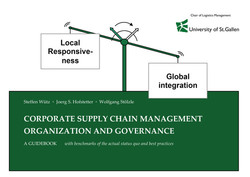| Departments | |
|---|---|
| Book Series (96) |
1381
|
| Nachhaltigkeit |
3
|
| Gesundheitswesen |
1
|
| Humanities |
2370
|
| Medienwissenschaften | 16 |
| Theology | 57 |
| Philosophy | 102 |
| Law | 424 |
| Economics | 851 |
| Social sciences | 418 |
| Sports science | 48 |
| Psychology | 233 |
| Educational science | 190 |
| History | 183 |
| Art | 111 |
| Cultural studies | 166 |
| Literary studies | 117 |
| Linguistics | 88 |
| Natural Sciences |
5408
|
| Engineering |
1795
|
| Common |
98
|
|
Leitlinien Unfallchirurgie
5. Auflage bestellen |
|
Advanced Search
Corporate Supply Chain Management Organization and Governance (English shop)
A Guidebook with benchmarks of the actual status quo and best practices
Joerg S. Hofstetter (Author)Wolfgang Stölzle (Author)
Steffen Wütz (Author)
Preview
Table of Contents, PDF (53 KB)
Extract, PDF (130 KB)
Within companies, supply chain management (SCM) focuses on aligning the activities of business functions involved in material, information and financial flows from material sourcing to product distribution along SCM processes. Generally, firms have implemented SCM processes on local levels.
Corporate SCM aims at aligning all similar SCM processes on a corporate level that were previously run independently on a smaller scale on diverse local levels individually. Benefits are a fast implementation of global best practices and economies of scale through the streamlining of tasks. At the same time, external relationships with customers, suppliers and other stakeholders require local adaptation of SCM processes, which limits the scope of global alignment.
Balancing between global alignment and local responsiveness is a key strategic question to corporate SCM. This guidebook proposes a new governance approach to identify and implement the appropriate degree of alignment of local, regional or national SCM processes across the company for an appropriate corporate SCM organization. Based on our accompanied scientific survey, we also show benchmarks and best practices on how companies organize their corporate SCM to date.
| ISBN-13 (Hard Copy) | 9783736992375 |
| ISBN-13 (eBook) | 9783736982376 |
| Final Book Format | other |
| Language | English |
| Page Number | 50 |
| Lamination of Cover | matt |
| Edition | 1. Aufl. |
| Publication Place | Göttingen |
| Publication Date | 2016-06-01 |
| General Categorization | Dissertation |
| Departments |
Economics
Business economics |
| Keywords | Supply chain management, organization, governance, multinational company, cross-functional business processes, bechmarks |








